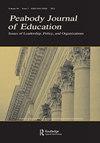“我们为什么要离开?”:新冠肺炎时代三位母亲学者想象可能性的生活体验初探
Q2 Social Sciences
引用次数: 1
摘要
摘要在新冠肺炎肆虐之际,我们的公共和私人空间以前所未有的方式融合在一起,为母亲和学术空间的协同发展带来了独特的挑战和新的机遇。我们使用叙事调查来探索我们作为LDS MotherScholars的生活经历,通过进行三个故事周期,使用关于过去、现在和想象中的未来可能性的提示。具体而言,我们寻找新出现的新冠肺炎大流行为我们重新设想在家庭和工作场所协调生活提供的机会。这些故事揭示了MotherScholarship内在的后勤和情感紧张,表明在这两个领域都存在潜在失败的紧迫感。我们的分析确定了隐藏/划分自我部分的模式,以及母性和学术之间的相似之处。使用立场理论,我们拒绝了“平衡”的概念,认为它是无用的(或真实的),因为我们重新设想我们作为母亲学者的未来生活被“编织”在包括母亲和学术在内的空间中。在新冠肺炎期间,出现了一些优雅的时刻,阐明了进入第三空间的新可能性和机会,以应对和挑战压迫性的以男性为中心的假设,并重新审视我们作为母亲学者的工作。本文章由计算机程序翻译,如有差异,请以英文原文为准。
“Why Do We Have to Go Away?”: A Beginning Exploration into the Lived Experience of Three MotherScholars Imagining Possibilities in the Time of COVID-19
ABSTRACT In this time of COVID-19, our public and private spaces have come together in unprecedented ways, giving rise to unique challenges and new opportunities to synergize maternal and academic spaces. We use narrative inquiry to explore our lived experiences as LDS MotherScholars by conducting three story cycles, using prompts about the past, present, and imagined possibilities for the future. Specifically, we looked for ways the emerging COVID-19 pandemic provided opportunities for us to reimagine harmonizing our lives across home and workspaces. Stories revealed the logistical and emotional tensions inherent in MotherScholarship, pointing to an urgent high-stakes sense of potential failure in both arenas. Our analyses identified patterns of hiding/compartmentalizing parts of self, as well as similarities between motherhood and scholarship. Using Standpoint theory, we rejected the notion of ”balance” as not useful (or real) as we re-envisioned our future lives as MotherScholars being ”braided” across spaces that include both motherhood and scholarship. During COVID-19, moments of grace have emerged that illuminate new possibilities and opportunities to enter a third space in order to confront and challenge oppressive androcentric assumptions and re-envision our work as MotherScholars.
求助全文
通过发布文献求助,成功后即可免费获取论文全文。
去求助
来源期刊

Peabody Journal of Education
Social Sciences-Education
CiteScore
2.20
自引率
0.00%
发文量
43
期刊介绍:
Peabody Journal of Education (PJE) publishes quarterly symposia in the broad area of education, including but not limited to topics related to formal institutions serving students in early childhood, pre-school, primary, elementary, intermediate, secondary, post-secondary, and tertiary education. The scope of the journal includes special kinds of educational institutions, such as those providing vocational training or the schooling for students with disabilities. PJE also welcomes manuscript submissions that concentrate on informal education dynamics, those outside the immediate framework of institutions, and education matters that are important to nations outside the United States.
 求助内容:
求助内容: 应助结果提醒方式:
应助结果提醒方式:


